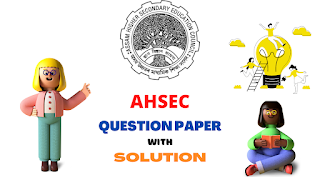AHSEC| CLASS 11| HISTORY| SOLVED PAPER - 2020| H.S.1ST YEAR
2020
HISTORY
Full Marks: 100
Pass Marks: 30
Time: 3 hours
The figures in the margin indicate full marks for the questions
1. Answer the following questions: 1x12=12
(a) Write two
important sources to study early human history.
Ans:- Here
are two important sources to study early human history:-
(i) Early
human fossils
(ii)
Archaeological remains
(b) What was
the earliest language of Mesopotamia?
Ans:- The
earliest language of Mesopotamia was Sumerian. It was replaced by the Akkadian
language around 2400 BC.
(c) Who was
Cleopatra?
Ans:-
Cleopatra was the last pharaoh of Egypt and the only queen in the ancient world
who ruled in her own right.
(d) What is
Principate?
Ans:- The
Principate was a form of government in the Roman Empire from 27 BC to AD 284.
(e) In which
year did Vasco da Gama reach Calicut port?
Ans:- In
1498 AD, Vasco da Gama reached Calicut port of India.
(f) When did
the Ottoman Turks conquer Constantinople?
Ans:- On
May 29, 1453, the Ottoman Turks captured Constantinople. This event is also
known as the Fall of Constantinople.
(g) Name the
first printed book.
Ans:- Gutenberg Bible.
(h) From
which word is the word ‘feudalism’ derived?
Ans:- The
word "feudalism" comes from the German word "feud", meaning
"a piece of land".
(i) In which
year did India first conduct nuclear test?
Ans:-
India conducted its first successful nuclear weapon test on 18 May 1974 in
Pokhran, Rajasthan. The test was codenamed "Operation Smiling Buddha"
or "Operation Happy Krishna".
(j) Name
world’s first two cities that were connected by the railways.
Ans:- The
Liverpool and Manchester Railway (L&MR) was the world's first inter-city
railway, connecting the English cities of Liverpool and Manchester in 1830.
(k) Name the
first woman Prime Minister of the world.
Ans:-
Sirimavo Bandaranaike was the world's first female Prime Minister, elected on
July 21, 1960.
(l) When did
the Japanese woman first get the right to vote?
Ans:-
This was realized on December 15, 1945, when the electoral law was amended,
allowing women over the age of twenty to vote in elections.
2. Answer the following questions in brief: 2x12=24
(a)
Differentiate hominoids from monkeys.
Ans:- Here
are some differences between hominoids and monkeys:-
(i)
Posture: The posture of hominoids is more erect than that of monkeys and
they can often walk on two legs.
(ii)
Senses: Hominoids rely more on vision than smell and have smaller noses
than some monkeys.
(b) Name two
sites where the earliest evidences of making and using stone tools were found.
Ans:- The
earliest evidence of stone tool making and use comes from Ethiopia and Kenya.
(c) What do
you understand by ‘transhumance’?
Ans:-
Transhumance is a type of pastoralism or nomadism that involves the seasonal
movement of livestock between different areas with different climates.
(d) Name the
two divisions of the Muslim society formed during the reign of Ali, the fourth
Caliph.
Ans:-
During the reign of the fourth Caliph Ali, Islam divided into two sects: Shia
and Sunni.
Ali was the
cousin and son-in-law of the Prophet Muhammad and ruled from 656 to 661 AD. He
is considered the fourth and last of the "rightly guided" caliphs by
Sunni Muslims, and the first Imam and rightful caliph by Shia Muslims.
(e) Write two
duties of monks.
Ans:- Here
the monks have two duties:-
(i) Spread
of Christianity: Monks and nuns kept moving from one place to another to
spread the message of Christianity among the people. He preached and taught
people about Christianity.
(ii)
Charity: Monasteries served as shelter for the poor and needy. He also
provided food and clothes to the needy.
(f) Name two
famous women humanists of medieval period.
Ans:- Here
are some famous women of the medieval period:-
(i)
Hildegard of Bingen: (1098–1179) a German polymath, mystic, healer,
scientist, visionary, writer, musician and abbess. She claimed to have had
visions of God since she was three years old.
(ii)
Christine de Pizan: (1364–c1430) an outspoken feminist and leading medieval
woman. He was raised by an unconventional father who supported his studies and
desire to learn.
(g) Write the
importance of guilds as an economic organization.
HISTORY SOLVED PAPERS PAGE LINK - Click here
BUY E-BOOK (PDF FILE)
[TO SEE FULL SOLUTION]
(Chapter wise Notes, Exam Question Papers solved, MCQ solved) [ARTS, COMMERCE, SCIENCE]
|
DOWNLOAD PAGE LINK:-CLICK HERE |
AHSEC PAGE LINK - CLICK HERE
Also Read:

